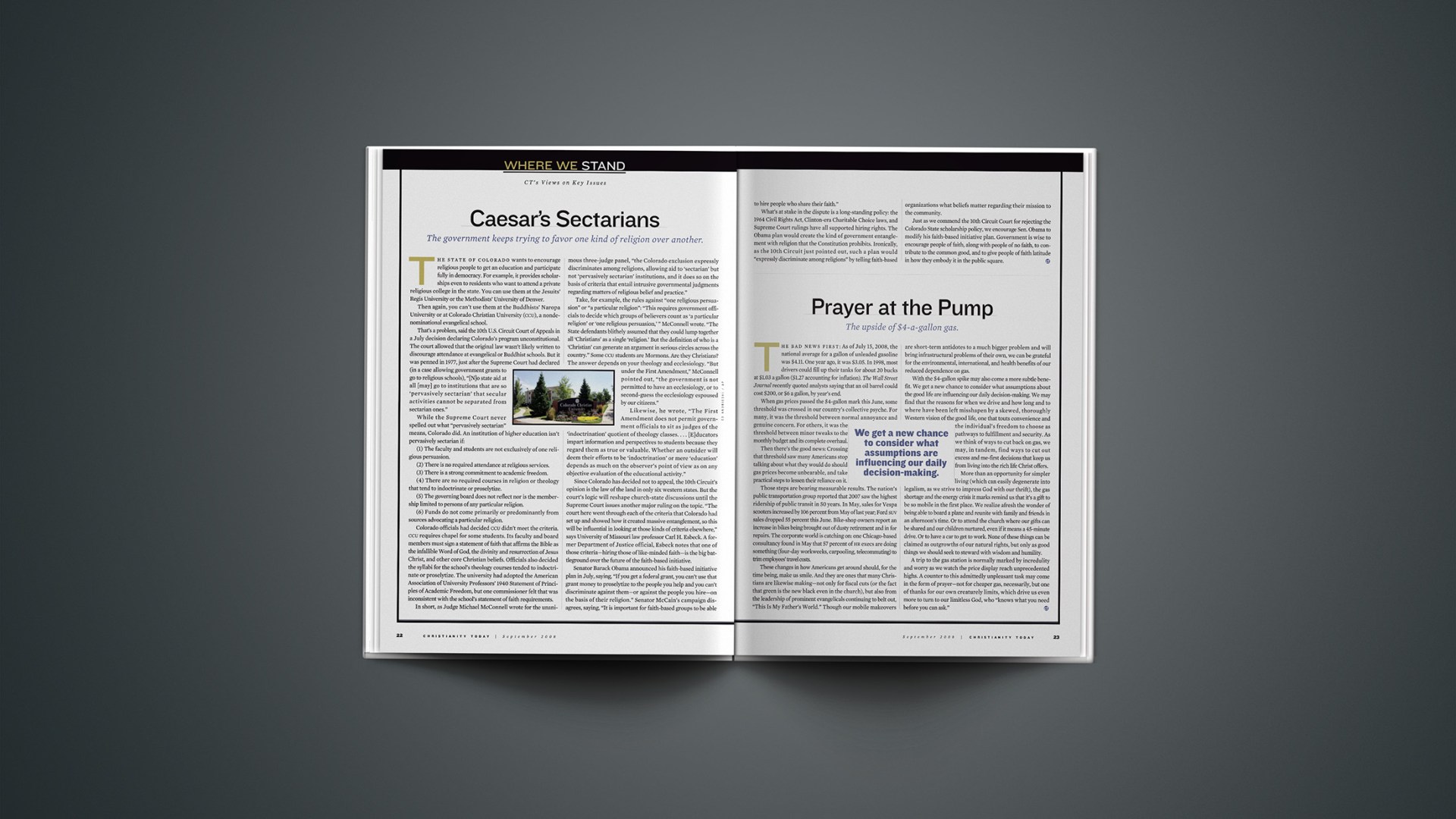The state of Colorado wants to encourage religious people to get an education and participate fully in democracy. For example, it provides scholarships even to residents who want to attend a private religious college in the state. You can use them at the Jesuits’ Regis University or the Methodists’ University of Denver.
Then again, you can’t use them at the Buddhists’ Naropa University or at Colorado Christian University (CCU), a nondenominational evangelical school.
That’s a problem, said the 10th U.S. Circuit Court of Appeals in a July decision declaring Colorado’s program unconstitutional. The court allowed that the original law wasn’t likely written to discourage attendance at evangelical or Buddhist schools. But it was penned in 1977, just after the Supreme Court had declared (in a case allowing government grants to go to religious schools), “[N]o state aid at all [may] go to institutions that are so ‘pervasively sectarian’ that secular activities cannot be separated from sectarian ones.”
While the Supreme Court never spelled out what “pervasively sectarian” means, Colorado did. An institution of higher education isn’t pervasively sectarian if:
(1) The faculty and students are not exclusively of one religious persuasion.
(2) There is no required attendance at religious services.
(3) There is a strong commitment to academic freedom.
(4) There are no required courses in religion or theology that tend to indoctrinate or proselytize.
(5) The governing board does not reflect nor is the membership limited to persons of any particular religion.
(6) Funds do not come primarily or predominantly from sources advocating a particular religion.
Colorado officials had decided CCU didn’t meet the criteria. CCU requires chapel for some students. Its faculty and board members must sign a statement of faith that affirms the Bible as the infallible Word of God, the divinity and resurrection of Jesus Christ, and other core Christian beliefs. Officials also decided the syllabi for the school’s theology courses tended to indoctrinate or proselytize. The university had adopted the American Association of University Professors’ 1940 Statement of Principles of Academic Freedom, but one commissioner felt that was inconsistent with the school’s statement of faith requirements.
In short, as Judge Michael McConnell wrote for the unanimous three-judge panel, “the Colorado exclusion expressly discriminates among religions, allowing aid to ‘sectarian’ but not ‘pervasively sectarian’ institutions, and it does so on the basis of criteria that entail intrusive governmental judgments regarding matters of religious belief and practice.”
Take, for example, the rules against “one religious persuasion” or “a particular religion”: “This requires government officials to decide which groups of believers count as ‘a particular religion’ or ‘one religious persuasion,’ ” McConnell wrote. “The State defendants blithely assumed that they could lump together all ‘Christians’ as a single ‘religion.’ But the definition of who is a ‘Christian’ can generate an argument in serious circles across the country.” Some CCU students are Mormons. Are they Christians? The answer depends on your theology and ecclesiology. “But under the First Amendment,” McConnell pointed out, “the government is not permitted to have an ecclesiology, or to second-guess the ecclesiology espoused by our citizens.”
Likewise, he wrote, “The First Amendment does not permit government officials to sit as judges of the ‘indoctrination’ quotient of theology classes. … [E]ducators impart information and perspectives to students because they regard them as true or valuable. Whether an outsider will deem their efforts to be ‘indoctrination’ or mere ‘education’ depends as much on the observer’s point of view as on any objective evaluation of the educational activity.”
Since Colorado has decided not to appeal, the 10th Circuit’s opinion is the law of the land in only six western states. But the court’s logic will reshape church-state discussions until the Supreme Court issues another major ruling on the topic. “The court here went through each of the criteria that Colorado had set up and showed how it created massive entanglement, so this will be influential in looking at those kinds of criteria elsewhere,” says University of Missouri law professor Carl H. Esbeck. A former Department of Justice official, Esbeck notes that one of those criteria—hiring those of like-minded faith—is the big battleground over the future of the faith-based initiative.
Senator Barack Obama announced his faith-based initiative plan in July, saying, “If you get a federal grant, you can’t use that grant money to proselytize to the people you help and you can’t discriminate against them—or against the people you hire—on the basis of their religion.” Senator McCain’s campaign disagrees, saying, “It is important for faith-based groups to be able to hire people who share their faith.”
What’s at stake in the dispute is a long-standing policy: the 1964 Civil Rights Act, Clinton-era Charitable Choice laws, and Supreme Court rulings have all supported hiring rights. The Obama plan would create the kind of government entanglement with religion that the Constitution prohibits. Ironically, as the 10th Circuit just pointed out, such a plan would “expressly discriminate among religions” by telling faith-based organizations what beliefs matter regarding their mission to the community.
Just as we commend the 10th Circuit Court for rejecting the Colorado State scholarship policy, we encourage Sen. Obama to modify his faith-based initiative plan. Government is wise to encourage people of faith, along with people of no faith, to contribute to the common good, and to give people of faith latitude in how they embody it in the public square.
Copyright © 2008 Christianity Today. Click for reprint information.
Related Elsewhere:
Inside Higher Ed reported on the ruling.
Other editorials are available on our site.










